|
|
|
Sort Order |
|
|
|
Items / Page
|
|
|
|
|
|
|
| Srl | Item |
| 1 |
ID:
100074
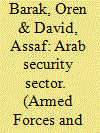

|
|
|
|
|
| Publication |
2010.
|
| Summary/Abstract |
This article discusses the lack of adequate attention to the Arab Security Sector and its complex political and social roles in the Arab States and presents the contours of a new research agenda for this topic. First, the authors demonstrate the insufficient scholarly attention accorded to the Arab Security Sector in several academic publications in the fields of Middle East Studies and Security Studies in the period 1990 -2005. Second, they focus on three major areas where recent theoretical and comparative advances in the study of civil-military relations have not been paralleled in the study of the Arab Security Sector: (1) the role of the Arab Security Sector in the process of state formation; (2) informal connections between actors within the Arab Security Sector and actors operating in the political system; and (3) the role of the Arab Security Sector in reflecting and reinforcing patterns of intersectoral relations in the Arab States.
|
|
|
|
|
|
|
|
|
|
|
|
|
|
|
|
| 2 |
ID:
110260


|
|
|
|
|
| Publication |
2012.
|
| Summary/Abstract |
The moves leading to the military involvement of the Arab states in the Palestine war in May 1948 deserve an examination in the context of the socio-political conditions that prevailed in the Arab states, The invasion of Palestine by Arab armies marked the intersection of two lines of conflict. One was the conflict between the Arab states and the ruling dynasties. The other was the socio-political conflict between the ruling conservative elites opposed to the deep socio-economic and political reforms needed by the modern middle strata, the effendiyya. The purpose of this article is to examine the domestic socio-political struggles, the compelling nationalist discourse in the Arab states and the interaction of that discourse with the regional inter-Arab relations that led the Arab states to war against Israel in May 1948.
|
|
|
|
|
|
|
|
|
|
|
|
|
|
|
|
| 3 |
ID:
119003
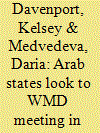

|
|
|
| 4 |
ID:
084594
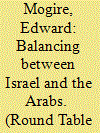

|
|
|
|
|
| Publication |
2008.
|
| Summary/Abstract |
This article attempts to illuminate Kenya-Middle East relations using a range of indicators such as trade, political-diplomatic interactions and Kenya's reaction to the Arab-Israel conflict. It examines the main factors underpinning this relationship and the form it is likely to take in the future. It shows that Kenya has strived to maintain relations with both the Arab-Islamic states and Israel. Although at the multilateral level Kenya's orientation tends to be pro-Arab, at the bilateral level it has maintained a close relationship with Israel. Kenya's foreign policy is non-alignment, support for African unity, and a radical orientation characterized by idealism as well as economic and security interests. Internal political imperatives, especially the Muslim influence, are the main factors underpinning Kenya-Middle East relations. While economic considerations will propel Kenya to strengthen its relations with Arab countries, security concerns, especially in the light of terrorist attacks, will ensure that relations with Israel will remain strong.
|
|
|
|
|
|
|
|
|
|
|
|
|
|
|
|
| 5 |
ID:
025501
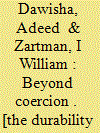

|
|
|
|
|
| Publication |
London, Croom Helm, 1988.
|
| Description |
xi, 310p.hbk
|
| Series |
Nation, State and Integration in the Arab World
|
| Contents |
Vol. III
|
| Standard Number |
0709941498
|
|
|
|
|
|
|
|
|
|
|
|
Copies: C:1/I:0,R:0,Q:0
Circulation
| Accession# | Call# | Current Location | Status | Policy | Location |
| 029424 | 956/DAW 029424 | Main | On Shelf | General | |
|
|
|
|
| 6 |
ID:
188832
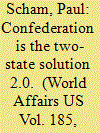

|
|
|
|
|
| Summary/Abstract |
In the wake of the failure of the “classic” two-state solution to make headway since the collapse of the Camp David negotiations in 2000, the idea of a confederal solution to the Israeli–Palestinian conflict is being increasingly seen as a realistic political format by Palestinians and Israelis of both the left and the right. Examples and models of reconciliation and confederation are discussed in this article and certain myths, including that religious strictures are unchangeable, are challenged. The author concludes that confederation is possible, though admittedly difficult, and seems the only viable alternative to the stalemated status quo.
|
|
|
|
|
|
|
|
|
|
|
|
|
|
|
|
| 7 |
ID:
153033


|
|
|
| 8 |
ID:
099059
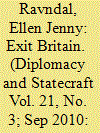

|
|
|
|
|
| Publication |
2010.
|
| Summary/Abstract |
The British decision to withdraw from the Palestine mandate in 1947-1948 may at first glance appear contradictory to British strategic interests. The Middle East and Palestine were vital to Britain's Cold War strategy, and its government repeatedly stated the need for a continued British presence in the region to prevent Soviet expansion. Why then withdraw from Palestine just as the Cold War started? The traditional explanation is that Britain withdrew because of economic exhaustion and its inability to remain a great power. But this article shows that economic and strategic considerations both contributed to the decision to withdraw. Britain's involvement in Palestine threatened to undermine its relations with the independent Arab states, and the decision to withdraw from Palestine was therefore taken in the hope that this would secure Britain's position in the rest of the Middle East.
|
|
|
|
|
|
|
|
|
|
|
|
|
|
|
|
| 9 |
ID:
171582


|
|
|
| 10 |
ID:
128215
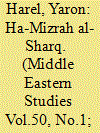

|
|
|
|
|
| Publication |
2014.
|
| Summary/Abstract |
During the span of 22 months stretching from the entry of Fayal b. Husayn into Damascus in October 1918 until his expulsion at the end of July 1920, 42 newspapers and 13 journals appeared in Syria, more than half of them in Damascus. During this time, in which the press had a critical role in expressing and shaping public opinion in Syria, it became clear to the emissaries of the Zionist institutions in Damascus that they, too, needed to turn to this medium in order to spread their message. Hence, they argued that there was a need to publish a newspaper reflecting a moderate and calming outlook that would draw Arabs and Jews nearer to and increase their understanding of the Zionist idea. The result of their activities in this area saw the founding of a bilingual, Hebrew and Arabic, newspaper, called ha-Mizrah/al-Sharq ('The East'). An examination of the only extant copies of the three issues that were printed before the newspaper ceased publication provides us with a deeper observation into the Zionist activities in Damascus during the reign of King Fayal.
|
|
|
|
|
|
|
|
|
|
|
|
|
|
|
|
| 11 |
ID:
179808


|
|
|
|
|
| Summary/Abstract |
All Arab states, including the Gulf states, are regularly considered an anomaly in International Relations: allegedly artificially created, lacking clear identity, borders and sovereignty. We challenge this assertion by looking at one dimension of sovereignty often overlooked: the air space. We measure this assertion along the classical lines of sovereignty: do the states have the institutions, regulations and capacity to manage their air space, do they use it for economic and diplomatic purposes, do they have the means to conduct war in it, and does it feature in their national identity? We find that particularly since 1990, the Gulf States have affirmed their sovereignty markedly in all these areas. These findings show two things: that sovereignty can be a feature of a state regardless of the nature of its creation, and that it can be affirmed in a space previously overlooked, the air.
|
|
|
|
|
|
|
|
|
|
|
|
|
|
|
|
| 12 |
ID:
165287
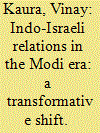

|
|
|
|
|
| Summary/Abstract |
India’s West Asia policy is being constantly reshaped under the tutelage of Indian Prime Minister Narendra Modi, whose Israel visit in July 2017 represents a momentous milestone in the Indo-Israeli relationship. The first ever visit of an Indian prime minister to the Jewish state unambiguously underscores that New Delhi under Modi is confident enough to deal with Israel as it deals with any other state in the volatile West Asian region without being concerned about third parties. Modi has been unequivocal in showing the importance India accords to its ties with Israel.
|
|
|
|
|
|
|
|
|
|
|
|
|
|
|
|
| 13 |
ID:
188829


|
|
|
|
|
| Summary/Abstract |
This article introduces the World Affairs 2022 special issue which contains ten contributions, including this one, debating the proposal for an Israeli-Palestinian-Jordanian confederation published in this journal earlier this year. In the present article, I continue and expand some of the arguments in the previous proposal. The notion that the time is not ripe to bring an end to the Israeli-Palestinian conflict is misguided and extremely dangerous. When and how a more conducive environment will be created to restart peace negotiations remains elusive. Even a cursory review of the daily encounters between Israelis and Palestinians in the occupied territories and Gaza point to the intensity of hatred, enmity, and utter contempt they feel toward one another, which if continued unabated will be a recipe for an unprecedented violent conflagration. To avert the inevitable, every concerned individual must do everything humanly possible to help in creating new psychological, political, and physical conditions that would facilitate a dialogue and engender a new momentum to start a process of reconciliation before it is too late. This should eventually lead to the establishment of an independent Palestinian state under the umbrella of an Israeli-Palestinian-Jordanian confederation, where all three countries maintain their independence and can grow and prosper together and live in mutual security and peace.
|
|
|
|
|
|
|
|
|
|
|
|
|
|
|
|
| 14 |
ID:
123544


|
|
|
| 15 |
ID:
117397
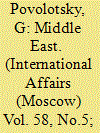

|
|
|
|
|
| Publication |
2012.
|
| Summary/Abstract |
THE EVENTS, known as the Arab Spring, which in 2011 shattered some of the Arab states of the Greater Middle East, have triggered military-political and military-strategic developments worldwide. Their whole gamut can hardly be grasped: what happened in individual countries and the region as a whole unfolded in different temporal scales and was planned and realized on different scenes: geopolitical, regional and local. To predict future developments in the Greater Middle East, one should look deep into what has already happened and what is going on in the region. The analytical report "The Middle East: Possible Variants of Transformation Processes"* (issued by the Center for Middle Eastern Studies at the Institute for Contemporary International Studies (Moscow State Institute (University) of International Relations, Ministry of Foreign Affairs of the Russian Federation) can be described as one of the best and carefully substantiated attempts to look into the region's future and assess the results of the recent developments.
|
|
|
|
|
|
|
|
|
|
|
|
|
|
|
|
| 16 |
ID:
025981
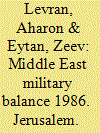

|
|
|
|
|
| Publication |
Jerusalem, Jerusalem Post, 1987.
|
| Description |
462p.hbk
|
| Series |
Jaffee Center for Strategic Studies
|
| Standard Number |
0813304628
|
|
|
|
|
|
|
|
|
|
|
|
Copies: C:1/I:0,R:1,Q:0
Circulation
| Accession# | Call# | Current Location | Status | Policy | Location |
| 029519 | 355.033056/LEV 029519 | Main | On Shelf | Reference books | |
|
|
|
|
| 17 |
ID:
142148
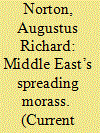

|
|
|
|
|
| Summary/Abstract |
Many of the Arab states see the uprisings, the Iraq war, and the rise of ISIS as fundamentally related. All of these issues are complicated by the Iran deal.”
|
|
|
|
|
|
|
|
|
|
|
|
|
|
|
|
| 18 |
ID:
115801


|
|
|
| 19 |
ID:
067572


|
|
|
|
|
| Publication |
London, I B Tauris, 2005.
|
| Description |
vii, 311p.hbk
|
| Standard Number |
1850439710
|
|
|
|
|
|
|
|
|
|
|
|
Copies: C:1/I:0,R:0,Q:0
Circulation
| Accession# | Call# | Current Location | Status | Policy | Location |
| 050595 | 953.6/DRE 050595 | Main | On Shelf | General | |
|
|
|
|
| 20 |
ID:
124367
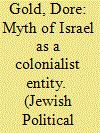

|
|
|
|
|
| Publication |
2011.
|
| Summary/Abstract |
While modern Israel was born in the aftermath of the British Mandate for Palestine, which called for a Jewish national home, its roots preceded the arrival of the British to the Middle East. In that sense Britain was not Israel's mother-country, like France was for Algeria. Indeed, the Jews were already reestablishing their presence independently in their land well before the British and French dismantled the Ottoman Empire. As time went on, it became clear that the British Empire was not the handmaiden of Israel's re-birth, but rather its main obstacle. The accusation that Israel has colonialist roots because of its connection to the British Mandate is ironic, since most of the Arab states owe their origins to the entry and domination of the European powers.
|
|
|
|
|
|
|
|
|
|
|
|
|
|
|
|
|
|
|
|
|